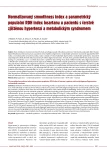-
Medical journals
- Career
Hereditary angioedema – neglected diagnosis
Authors: P. Králíčková 1; E. Burešová 1; T. Freiberger 2; I. Tachecí 3
Authors‘ workplace: Ústav klinické imunologie a alergologie Lékařské fakulty UK a FN Hradec Králové, přednosta prof. RNDr. Jan Krejsek, CSc. 1; Genetická laboratoř Centra kardiovaskulární a transplantační chirurgie Brno, ředitel doc. MU Dr. Petr Němec, CSc., FETCS 2; Oddělení gastroenterologie a hepatologie, vedoucí prof. MU Dr. Jan Bureš, CSc., II. interní kliniky Lékařské fakulty UK a FN Hradec Králové, přednosta prof. MU Dr. Jaroslav Malý, CSc. 3
Published in: Vnitř Lék 2010; 56(9): 927-931
Category: Case Reports
Overview
Hereditary angioedema caused by C1 esterase inhibitor deficiency is a rare autosomal dominant inherited disorder. It is characterized by reccurent episodes of potentially life ‑ threatening swellings without itching localized in the dermis and submucosa. We report a case of 41 years old woman with hereditary angioedema manifested as episodes of localized skin swellings and painful gastrointestinal colics. This report underlines the fact that hereditary angioedema is underdiagnosed in differential diagnoses. If hereditary angioedema is correctly diagnosed, effective treatment highly improving patients’ quality of life is available.
Key words:
angioedema – C1 inhibitor – danazol
Sources
1. Gompels MM, Lock RJ, Abinum M et al. C1 inhibitor deficiency: consensus document. Clin Exp Immunol 2005; 139 : 379 – 394.
2. Kuklínek P. Hereditární a získaný angioedém (deficit C1 – INH). In: Špičák V, Panzner P (eds). Alergologie. Praha: Galén 2004 : 257 – 262.
3. Cugno M, Zanichelli A, Foieni F et al. C1‑inhibitor deficiency and angioedema: molecular mechanisms and clinical progress. Trends Mol Med 2009; 15 : 69 – 78.
4. Krejsek J, Kopecký O. Klinická imunologie. Hradec Králové: Nucleus 2004 : 81 – 196.
5. Temiňo VM, Peebles RS Jr. The spectrum and treatment of angioedema. Am J Med 2008; 121 : 282 – 286.
6. Cichon S, Martin L, Hennies HC et al. Increased activity of coagulation factor XII (Hageman factor) cause hereditary angio-edema type III. Am J Hum Genet 2006; 79 : 1098 – 1104.
7. Rosen FS, Davis AE 3rd. Deficiencies of C1 inhibitor. Best Pract Res Clin Gastroenterol 2005; 19 : 251 – 261.
8. Bork K, Meng G, Staubach P et al. Hereditary angioedema: New findings concerning symptoms, affected organs, and course. Am J Med 2006; 119 : 267 – 274.
9. Craig T, Riedl M, Dykewicz MS et al. When is prophylaxis for hereditary angio-edema necessary? Ann Allergy Asthma Immunol 2009; 102 : 366 – 72.
10. Cicardi M, Zingale L. How do we treat patients with hereditary angioedema. Transfus Apher Sci 2003; 29 : 221 – 227.
11. Bowen T, Herbert J, Ritchie B et al. Management of hereditary angioedema: a Canadian approach. Transfus Apher Sci 2003; 29 : 205 – 214.
12. Craig TJ, Levy RJ, Wasserman RL et al. Efficacy of human C1 esterase inhibitor concentrate compared with placebo in acute hereditary angioedema attacks. J Allergy Clin Immunol 2009; 124 : 801 – 808.
13. Christiansen SC, Zuraw BL. Update on therapeutic developments for hereditary angioedema. Allergy Asthma Proc 2009; 30 : 500 – 505.
14. De Serres J, Gröner A, Lindner J. Safety and efficacy of pasteurized C1 inhibitor concentrate (Berinet P) in hereditary angioedema: a review. Transfus Apher Sci 2003; 29 : 247 – 254.
15. Fincham CI, Bressan A, Paris M et al. Bradykinin receptor antagonista – a review of the patent literature 2005 – 2008. Expert Opin Ther Pat 2009; 19 : 919 – 941.
16. Roche O, Blanch A, Duponchel C et al. Hereditary angioedema: The mutation spectrum of SERPING1/ C1NH in a large Spanish cohort. Hum Mutat 2005; 26 : 135 – 144.
Labels
Allergology and clinical immunology Diabetology Endocrinology Internal medicine
Article was published inInternal Medicine

2010 Issue 9-
All articles in this issue
- The normalized smoothness index and parametric population RDH index of losartan in patients with newly diagnosed hypertension and metabolic syndrome
- Our experience with endoscopic drainage of pancreatic pseudocysts
- Cardiovascular morbidity in patients after treatment for testicular cancer
- Rivaroxaban and factor Xa inhibitors in clinical practice
- Hereditary angioedema – neglected diagnosis
- Adrenal incidentalomas – is the present management rational?
- Serum lipoprotein profile in newly recognized arterial hypertension. The role of atherogenic lipoproteins in the pathogenesis of disease
- Statin myopathy – rarity or reality?
- Glycaemia control in critically ill patients is justified and effective
- Heart and kidneys – a fatal relationship
- Hypertension in patients with diabetes mellitus
- Is our management of patients with claudicatio intermittens correct?
- Gastroenteropatic neuroendocrine tumors: multidisciplinary approach in therapy
- Arterial hypertension with orthostatic hypotension
- Immunotherapy and long‑term chemoprophylaxis in prevention of recurrent urinary infections in women
- Metabolic syndrome and aortic stiffness
- Internal Medicine
- Journal archive
- Current issue
- Online only
- About the journal
Most read in this issue- Heart and kidneys – a fatal relationship
- Our experience with endoscopic drainage of pancreatic pseudocysts
- Statin myopathy – rarity or reality?
- Adrenal incidentalomas – is the present management rational?
Login#ADS_BOTTOM_SCRIPTS#Forgotten passwordEnter the email address that you registered with. We will send you instructions on how to set a new password.
- Career

